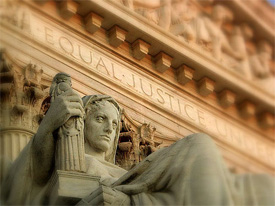Withholding the Tax Decision: SCOTUSblog on the ObamaCare Decision
Having served as the liveblog link to a widely-anticipated court decision myself, I probably read Tom Goldstein’s tick-tock of how the decision got reported differently than others. Most interesting for me?
SCOTUSblog is not credentialed to cover SCOTUS
Goldstein describes how most major news outlets as well as the White House listened in on a conference call SCOTUSblog had to discuss the ruling as it came out. He notes that Fox managed to correct its incorrect initial reporting because Megyn Kelly was watching SCOTUSblog. He describes other news outlets–like NPR–citing SCOTUSblog as their source.
And yet, even with all those people relying on SCOTUSblog for coverage of the decision (and all other decisions), SCOTUSblog is not credentialed to cover the court.
The Supreme Court will not grant SCOTUSblog a press credential. Lyle Denniston is the only member of our team permitted in the press area; he has a press credential because of his reporting for WBUR in Boston. There are six other members of our team nearby, running nine computers on eight separate Internet connections.
I’m curious what the justification for this stance is. Does the Court care more about its prestige than ensuring that what amounts to its own newswire be able to report quickly and accurately?
SCOTUS decided not to email the decision
Perhaps that’s the case. After all, SCOTUS also decided not to email the decision to reporters (and the parties to the case), though they have done so in the past.
The Court’s own technical staff prepares to load the opinion on to the Court’s website. In years past, the Court would have emailed copies of the decision to the Solicitor General and the parties’ lawyers once it was announced. But now it relies only on its website, where opinions are released approximately two minutes later. The week before, the Court declined our request that it distribute this opinion to the press by email; it has complete faith in the exceptional effort it has made to ensure that the website will not fail.
But it does. At this moment, the website is the subject of perhaps greater demand than any other site on the Internet – ever. It is the one and only place where anyone in the country not at the building – including not just the public, but press editors and the White House – can get the ruling. And millions of people are now on the site anxiously looking for the decision. They multiply the burden of their individual visits many times over – hitting refresh again, and again, and again. In the face of the crushing demand, the Court cannot publish its own decision.
The opinion will not appear on the website for a half-hour. So everyone in the country not personally at 1 First St., NE in Washington, DC is completely dependent on the press to get the decision right.
Aside from being a boneheaded technical decision, it is, again, a statement about the philosophy of information at the Court. Why insist that the decision go through those physically at the Court, where people have little space or time for close reading?
Who hacked SCOTUSblog?
And here’s the bit that has me most intrigued. When we covered the Libby trial, we were hounded by denial of service attacks, including on verdict day–though we were also operating on a less stable system with almost no staff and little time to prepare for the technical demands of the coverage, which I think made the attacks rewarding.
Plus, it wasn’t surprising someone would attack FDL during the Libby case; because we served as the wire service for the trial, and because we didn’t unquestioningly repeat whatever Barbara Comstock claimed, we ended up undermining Liibby’s defense team’s best efforts at spin. So I’ve always assumed our DNS hackers were conservatives trying to cut off our coverage, leaving the more favorable Libby spin by default.
So it made sense that we were getting attacked.
But SCOTUSblog?
Our problem at the moment is that someone is trying to crash the blog. At 10:00 exactly, hackers are launching a “distributed denial of service” attack with 1,000 page views per second to try and bring us down. It does not work; our tremendous Deputy Manager Max Mallory has spent months augmenting our capacity, and the hackers give up after a few minutes.
The only one who–assuming good faith interest in reporting accurately–who I can imagine having a motive to hack SCOTUSblog are other media outlets who don’t want a competitor to draw off potential readers and viewers.
Alternately, there’s the possibility that someone wanted the decision reported inaccurately. Read more →


